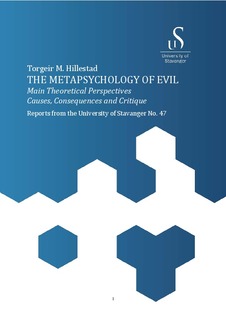The metapsychology of evil : main theoretical perspectives causes, consequences and critiques
Research report
Permanent lenke
http://hdl.handle.net/11250/274771Utgivelsesdato
2014-12Metadata
Vis full innførselSamlinger
Originalversjon
Hillestad, T.M (2014) The metapsychology of evil : main theoretical perspectives causes, consequences and critiquesSammendrag
This purpose of this text or dissertation is to throw some basic light on a fundamental problem concerning manhood, namely the question of evil, its main sources, dynamics and importance for human attitudes and behaviour. The perspective behind the analysis itself is that of psychology. Somebody, or many, may feel at bit nervous by the word “evil” itself. It may very well be seen as too connected to religion, myth and even superstition. Yet those who are motivated to lose oneself in the subject retain a deep interest in human destructiveness, malevolence and hate, significant themes pointing at threatening prospects for mankind.
The text is organized or divided into four main ordinary chapters, the three first of them organized or divided into continuous and numbered sections.
A crucial point or question is of cause how to define evil itself. It can of cause be done both intentional, instrumental and by consequence. Other theorists however have stated that the concept of evil exclusively rests on a myth originated in the Judean-Christian conception of Satan and ultimate evil. This last argument presupposes evil itself as non-existent in the real rational world. It seems however a fact that most people attach certain basic meaning to the concept, mainly that it represents ultimately bad and terrible actions and behaviour directed toward common people for the purpose of bringing upon them ultimate pain and suffer. However, there is no room for essentialism here, meaning that we simply can look “inside” some original matter to get to know what it “really” is. Rather, a phenomenon gets its identity from the constituted meaning operating within a certain human communities and contexts loaded with intentionality and inter-subjective meaning.

